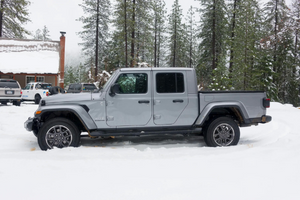Rev. Scott Harmon wrestles with what new adventures in faithful living God is calling the church to today.
SCOTT HARMON
Superintendent, Northern Skies District
Winter in the northern reaches of the Michigan Conference is known for snow. Some years it’s deeper than others, but rarely do we go without. As a result, many who venture out to enjoy the winter months opt for a four-wheel drive vehicle.
The other day, I noticed our neighbor came home with a new car of the four-wheel drive Jeep Gladiator variety. Take the old Jeep CJ, widen it to the Wrangler, extend it to four doors for the Wrangler Unlimited, and add a pickup bed. You have the Gladiator. The body style isn’t for everyone, but it’s hard to deny its functionality.
 Watching the neighbors come and go reminded me of the transportation our family had when I was a boy. A 1972 Volkswagen Beetle Convertible didn’t offer much status back then, but it was functional and got everyone to where they needed to be, even though it was rarely as warm through the winter as we might have liked.
Watching the neighbors come and go reminded me of the transportation our family had when I was a boy. A 1972 Volkswagen Beetle Convertible didn’t offer much status back then, but it was functional and got everyone to where they needed to be, even though it was rarely as warm through the winter as we might have liked.
It would be hard to find a starker difference between automobiles than the classic Bug and the new Gladiator. The catchy ad campaigns of “Live below your means” and “It’s ugly, but it gets you there” seem a little out of step with today’s images of bounding through canyons, but it’s been 40 years since the last Beetle rolled off the German assembly line. It was an icon of its time, though few would likely choose it today. Whether the Gladiator will be remembered similarly has yet to be seen, highlighting how we often condense time in making comparisons.
Thinking that a 1972 Beetle can be set next to a 2022 Gladiator for comparison is akin to comparing the 1967 and ’68 Green Bay Packers to the 2015 and ’17 New England Patriots. It’s an entertaining exercise, but the Patriots weren’t even born in ’67, and the Packers were old men (no offense intended) by ’15. Today, precious few classic Beetles are still being driven as the primary year-round automobile. Cars are indeed rebuilt, but as nostalgic toys—more vessels of memory than the transportation they were designed to be.
 Long ago, how memory and comparison play out in the Christian community caught my attention in the correspondence between German theologian Dietrich Bonhoeffer and his good friend Eberhard Bethge.
Long ago, how memory and comparison play out in the Christian community caught my attention in the correspondence between German theologian Dietrich Bonhoeffer and his good friend Eberhard Bethge.
Bonhoeffer was in prison in April 1944 when he wrote Bethge, posing a question: “If religion is only the garb in which Christianity is clothed—and this garb has looked very differently in different ages—what then is religionless Christianity?” To paraphrase, if Christianity has been expressed in remarkably different ways throughout history, from desert hermits to warring armies, from pacifist martyrs to revivalist dancers (to name a few), what is its essential center?
Bonhoeffer contended that Christ was that center, but what does that call us to? Does it mean saying (or not saying) certain words, doing (or refraining from) certain actions, making (or denying) specific affirmations, pledges, or confessions? It depends on where along the wide span of history you’re looking.
The nature of discipleship is to wrestle with what it means to faithfully respond to Christ’s call in our own time and place. Some claim this is subjectivism, that answers must be clear and concrete, but I would counter that God is far more mysterious than we are often comfortable with, and God has no grandchildren. Each of us must walk our own path of faith, humbly listening for what 1 Kings 19:12 identifies as the “still small voice” of God, for we are responsible to God alone for that journey.
 Years ago, a dusty shop manual long sat on a shelf in my grandfather’s garage. The memory of the 1938 Packard lasted far longer than the actual automobile. That ’72 Volkswagen, too, is long gone, though it represented a special time for our family. Still, needs change in different times and places. I must admit, I’m drawn to the new Gladiator’s invitation to adventure. The opportunity to climb mountains and explore new vistas in a vehicle that will take me there is a feeling I suspect my forebears also knew.
Years ago, a dusty shop manual long sat on a shelf in my grandfather’s garage. The memory of the 1938 Packard lasted far longer than the actual automobile. That ’72 Volkswagen, too, is long gone, though it represented a special time for our family. Still, needs change in different times and places. I must admit, I’m drawn to the new Gladiator’s invitation to adventure. The opportunity to climb mountains and explore new vistas in a vehicle that will take me there is a feeling I suspect my forebears also knew.
This Christian era we call our own—whatever that may be, familiar and comforting as it is—continues to call us to wrestle with faith. What does it mean to live as peacemakers, to love our neighbors, to give ourselves wholeheartedly to God as followers of Christ in this time and place? For some, the goal is to know the answers. Still, I’m comfortable with the apostle Paul’s insight that for now, we will only know partially, as in a mirror dimly, until we encounter the One who knows us completely (1 Corinthians 13:12). That is the invitation to life’s adventure, listening for the voice calling us here, now, today.
Until we meet along the path, may God sustain and guide us in our wrestling.
Last Updated on February 16, 2023

